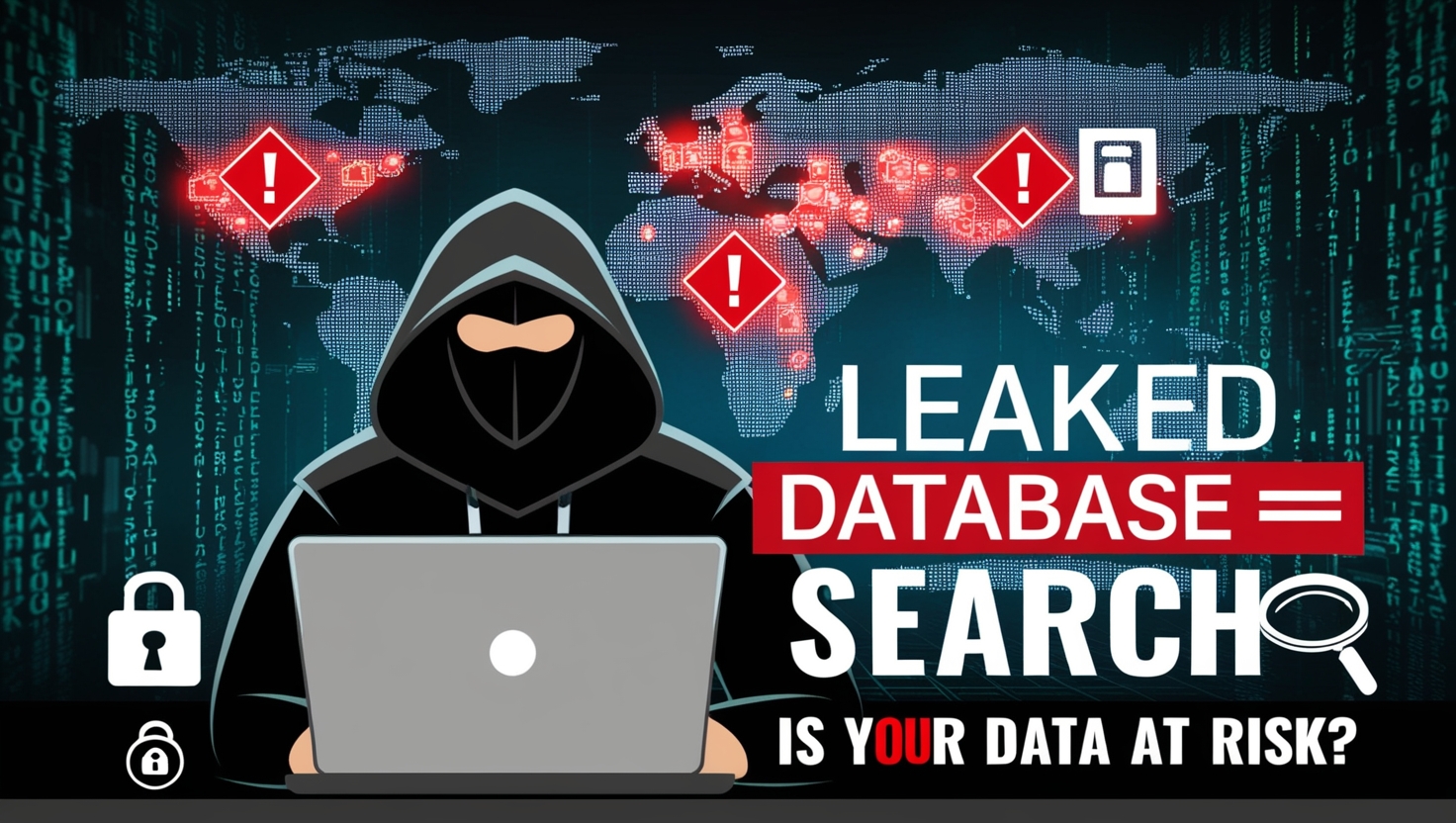1️⃣ 🔍 What is a Leaked Database? Understanding the Basics
A leaked database is a collection of sensitive information—such as email addresses, passwords, phone numbers, or even credit card details—that has been exposed due to data breaches, misconfigurations, or cyberattacks. In today’s digital age, cybercriminals constantly target websites, servers, and cloud systems. Once these attackers break in, they may dump user data online or sell it on the dark web.
The concept of a Leaked Databse search involves using specialized tools and websites to look for your personal or business data in these exposed databases. With billions of records already compromised across the internet, it’s critical to check whether your digital identity has been affected.
2️⃣ ⚠️ Why You Should Care About Leaked Database Searches
You might wonder: why should I care about a Leaked Databse search?
Here’s why:
- Identity Theft: Hackers can use your personal info to open bank accounts or take out loans in your name.
- Credential Stuffing: If you reuse passwords, attackers can gain access to other services.
- Reputational Damage: Leaked business or client data can ruin a company’s reputation.
- Financial Loss: Exposed credit card or banking details can lead to direct monetary theft.
Checking if your data is in a leaked database helps you take control early—before it’s too late.
3️⃣ 🛠️ Top Tools & Websites to Search Leaked Databases Legally
When conducting a Leaked Databse search, it’s essential to use legal and trustworthy tools. Here are some of the best platforms you can use:
- Have I Been Pwned: Enter your email to see if it has appeared in a data breach.
- DeHashed: Offers deeper insights, including phone numbers, usernames, and IPs.
- LeakCheck.io: Allows multi-type searches and breach lookups.
- Intelligence X: A privacy-focused OSINT tool to search for leaked content.
- BreachDirectory: A fast, user-friendly platform for breach lookups.
Always avoid shady sites that promise full database access—they’re often illegal and dangerous.
4️⃣ 👨💻 How Ethical Hackers & Cybersecurity Experts Use Leaked Databases
Cybersecurity professionals and ethical hackers don’t use leaked data for malicious reasons. Instead, they analyze leaks to:
- Test password strength across internal systems.
- Identify whether company credentials have been exposed.
- Report vulnerabilities to affected organizations.
- Improve incident response and breach preparedness.
During a Leaked Databse search, professionals focus on prevention—not exploitation. Their role is vital in defending digital infrastructure from future attacks.
5️⃣ 🔓 Famous Data Leaks That Shocked the World
Here are a few infamous breaches that highlight the importance of Leaked Databse search:
- Yahoo (2013–2014): Over 3 billion accounts were compromised.
- LinkedIn (2021): Data of 700 million users, including emails and job history, leaked.
- Facebook (2019 & 2021): Hundreds of millions of user records exposed.
- Adobe (2013): 153 million user credentials leaked.
- Equifax (2017): Personal data of 147 million Americans breached.
Each of these incidents led to massive financial, legal, and reputational consequences. Regular Leaked Databse search checks could help detect such risks sooner.
6️⃣ 🧭 Step-by-Step Guide: How to Check if Your Data Has Been Leaked
Want to perform your own Leaked Databse search? Follow these steps:
Step 1: Visit haveibeenpwned.com
Step 2: Enter your email address or phone number.
Step 3: Click “Pwned?” and wait for results.
Step 4: If your data has been found, the site will show which breaches it appeared in.
Step 5: Change your password immediately, especially if it’s reused elsewhere.
Step 6: Consider signing up for breach alert services or monitoring.
Repeat this process for each important email or username you use online.
7️⃣ 🚫 The Dangers of Using Illegal or Dark Web Leak Databases
While curiosity might tempt you to explore deep or dark web sources for data leaks, it’s extremely risky—and illegal in many jurisdictions.
Dangers include:
- Malware & Ransomware: Many dark web sites infect visitors with malware.
- Legal Trouble: Downloading or accessing unauthorized leaks can lead to arrest or fines.
- Fake Tools: Scammers often set up fake “leak search” tools to harvest your own data.
- Unethical Behavior: Viewing or using leaked data crosses privacy lines and undermines trust.
Stick to legal Leaked Databse search platforms to stay secure and ethical.
8️⃣ 🛡️ How to Protect Yourself from Future Data Leaks
After performing a Leaked Databse search, it’s crucial to strengthen your defenses. Here’s how:
- Use Strong, Unique Passwords: Never reuse the same password across multiple sites.
- Enable Two-Factor Authentication (2FA): Adds an extra layer of protection.
- Update Your Software Regularly: Prevents exploitation of known vulnerabilities.
- Use a Password Manager: Tools like Bitwarden or LastPass help manage secure credentials.
- Avoid Phishing Scams: Always verify suspicious emails before clicking.
The best defense is staying proactive and informed.
9️⃣ 👮♂️ The Role of Law Enforcement and Cybersecurity Agencies
Agencies like the FBI, Interpol, and Europol actively monitor, investigate, and shut down leak markets and forums. They work closely with cybersecurity firms to:
- Trace breach origins.
- Prosecute cybercriminals.
- Dismantle dark web platforms.
- Inform the public about major data leaks.
They also collaborate with ethical hackers during responsible disclosure processes. A well-timed Leaked Databse search can often act as an early warning, triggering investigations and alerts.
🔟 ✅ Conclusion: Stay Alert, Stay Secure
In the digital age, your data is always at risk. With the right knowledge and tools, a Leaked Databse search becomes a powerful weapon in your cybersecurity arsenal. Whether you’re a casual internet user or a cybersecurity enthusiast, regularly checking for exposed data helps you stay one step ahead of cybercriminals.
🔐 Don’t wait for a breach to catch you off guard—search, secure, and safeguard your digital life today!

Leave a Reply